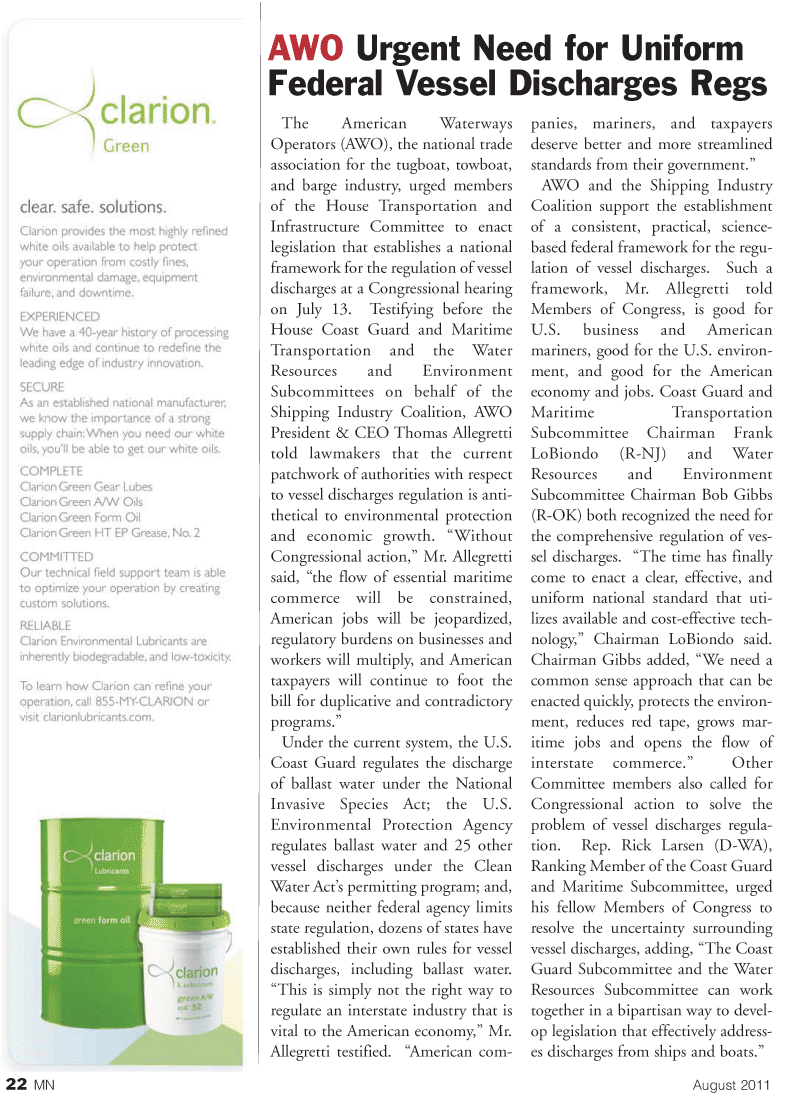
Page 22: of Marine News Magazine (August 2011)
Marine Salvage & Recovery Edition
Read this page in Pdf, Flash or Html5 edition of August 2011 Marine News Magazine
The American Waterways Operators (AWO), the national trade association for the tugboat, towboat, and barge industry, urged members of the House Transportation and Infrastructure Committee to enact legislation that establishes a nationalframework for the regulation of vessel discharges at a Congressional hearing on July 13. Testifying before the House Coast Guard and Maritime Transportation and the Water Resources and Environment Subcommittees on behalf of the Shipping Industry Coalition, AWO President & CEO Thomas Allegretti told lawmakers that the current patchwork of authorities with respect to vessel discharges regulation is anti- thetical to environmental protection and economic growth. Without Congressional action,? Mr. Allegretti said, the flow of essential maritime commerce will be constrained, American jobs will be jeopardized, regulatory burdens on businesses and workers will multiply, and American taxpayers will continue to foot the bill for duplicative and contradictory programs.? Under the current system, the U.S. Coast Guard regulates the discharge of ballast water under the National Invasive Species Act; the U.S. Environmental Protection Agency regulates ballast water and 25 other vessel discharges under the Clean Water Acts permitting program; and, because neither federal agency limitsstate regulation, dozens of states have established their own rules for vessel discharges, including ballast water. This is simply not the right way to regulate an interstate industry that is vital to the American economy,? Mr. Allegretti testified. American com- panies, mariners, and taxpayers deserve better and more streamlined standards from their government.? AWO and the Shipping Industry Coalition support the establishment of a consistent, practical, science-based federal framework for the regu- lation of vessel discharges. Such a framework, Mr. Allegretti told Members of Congress, is good for U.S. business and Americanmariners, good for the U.S. environ- ment, and good for the Americaneconomy and jobs. Coast Guard and Maritime Transportation Subcommittee Chairman Frank LoBiondo (R-NJ) and Water Resources and Environment Subcommittee Chairman Bob Gibbs (R-OK) both recognized the need for the comprehensive regulation of ves- sel discharges. The time has finally come to enact a clear, effective, and uniform national standard that uti- lizes available and cost-effective tech- nology,? Chairman LoBiondo said. Chairman Gibbs added, We need a common sense approach that can be enacted quickly, protects the environ- ment, reduces red tape, grows mar- itime jobs and opens the flow of interstate commerce.? Other Committee members also called forCongressional action to solve the problem of vessel discharges regula- tion. Rep. Rick Larsen (D-WA), Ranking Member of the Coast Guard and Maritime Subcommittee, urged his fellow Members of Congress to resolve the uncertainty surrounding vessel discharges, adding, The Coast Guard Subcommittee and the Water Resources Subcommittee can work together in a bipartisan way to devel- op legislation that effectively address- es discharges from ships and boats.? 22MNAugust 2011AWO Urgent Need for Uniform Federal Vessel Discharges Regs

 21
21

 23
23
